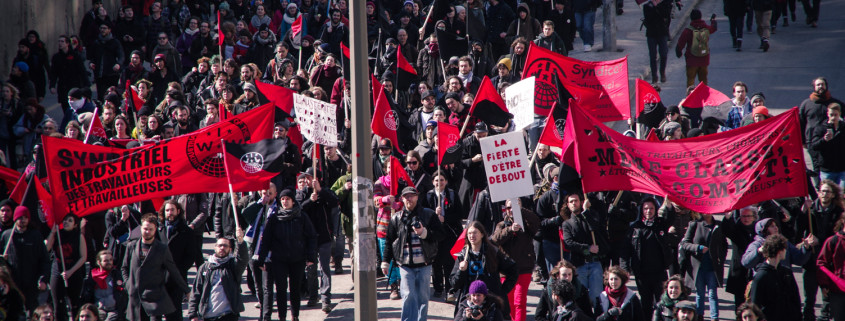Some highlights from labor and labor 2015
– The year began strongly with the invalidation of the law on essential services in Saskatchewan by the Supreme Court of Canada. Indeed, this law attacking the right to strike was considered harmful since it attacked the fundamental right of association of employee-e-s, including strike. And since the strike is an important and effective weight for workers facing their employer, it’s hardly surprising that it is so supervised and that employers, together, with the political class seek to muzzle it.
– To Montreal, a judge castigates the SPVM and the P-6 regulation; Randal Richmond believes non-disclosure of route during protest is not an offense: this therefore calls into question the arrests of more than 200 manifestant-e-s. Furthermore, judge stresses that law enforcement broke the law by signing statements of offense to colleagues who were not present during the protests. Also, in another case, Article 500.1, not to disturb traffic, is found to be invalid since it infringes the rights to organize and to demonstrate, rights protected by the Canadian Charter of Rights and Freedoms. Remember that the law is more of a shield than a weapon.
– Our union keeps growing, right here in Quebec, a branch was organized in Sherbrooke. It's the 26 March that it’s formalized the creation. One more step for workers in this city.
– During the whole year, negotiations between Quebec and the 550 000 public sector workers continue. Spring was punctuated by a few days of rotating strikes in different sectors as well as various union and student demonstrations, often bringing together a few tens of thousands of people. We saw suppressed nocturnal demonstrations, historical demonstrations in Val d´Or, Sept-Îles, and throughout the rest of Quebec. It would be the biggest national strike since 1972.
– Tension rises in Quebec City at the end of September when the city allows municipalities to decree working conditions if negotiations are at an impasse. Unions quickly rose to the fore as municipalities rejoiced in this power.

demonstration of 5 November 2015, female students, students with workers to speak out against austerity.
– Tension also rises in Montreal when blue-collar workers hold a general assembly attended by workers who were supposed to be at work, out, there will always be blue-collar workers at work during any general assembly concerning them. Sanctions have been sent to several blue-collar workers and union leaders, 2400 blue-collar workers were suspended in mid-December. In the meantime, in November, 4000 blue collar, after a general meeting, decide to go by school bus to the residence of the city's CEO to express their anger.
– It was at the end of the year that an agreement in principle was signed between the Common Front and the government, this includes the FIQ (Quebec Interprofessional Health Federation). Regarding the AWF (Autonomous Federation of Teaching) no arrangement has been signed and the SPGQ (Union of Professionals of the Government of Quebec) renews strike after Christmas.
– The Montreal branch of SITT-IWW has created a radio program focused on union information, working conditions and culture as well as militant history broadcast on Thursday morning at 9 a.m. at Radio Center-Ville (103,3 FM).
– May Day against the backdrop of a public sector strike was particularly eventful this year. With the traditional union demonstration in the afternoon, but also smaller and scattered events in the city of Montreal which converged on the city center taking care to be disruptive. Cayenne pepper, the batons, the charges, the handcuffs, the shields, tear gas, the entire repressive arsenal of "crowd control" has been deployed to counter women workers, workers, students and their supporters. SITT-IWW was particularly active during the previous year in organizing this disruptive day, especially in the morning in front of Radio-Canada premises.
– In Windsor as well as in Ottawa, in Ontario, a group of homeless people and street artists joined the IWW as Street Labourers Of Windsor (SLOW) in order to acquire the same rights as the rest of the population. A person's rights should not be based on the money earned by that person, there is therefore discrimination against certain social classes, especially the homeless and street artists. Union also wants to fight prejudice against the street, point out that psychological problems, emotional distress or physical disabilities are often the cause of job loss and pose huge barriers to getting a new job, leading too often to the street.




Leave a Reply
Want to join the discussion?Feel free to contribute!